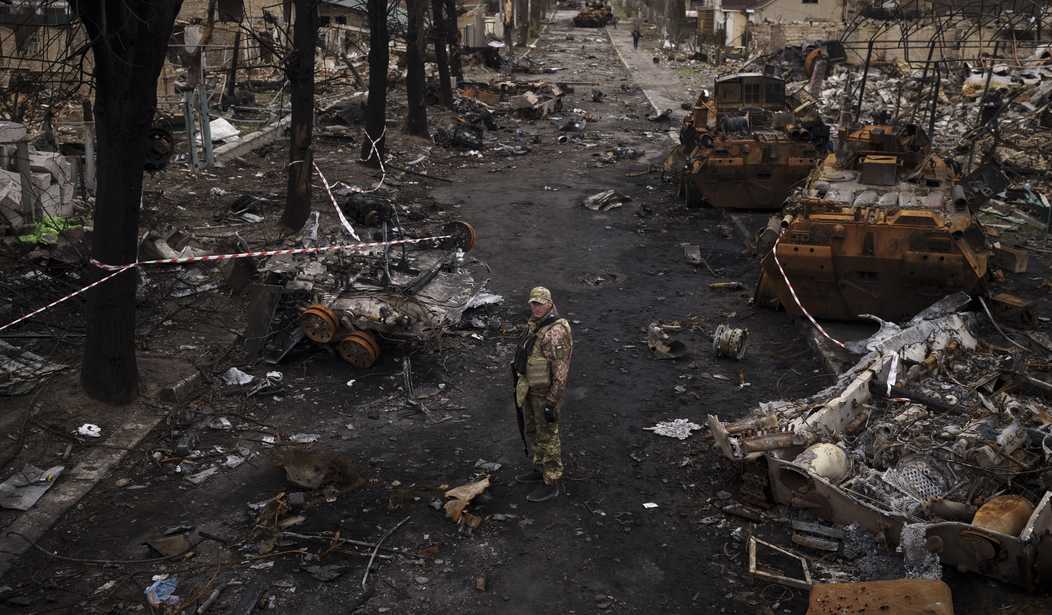Last year, the United States sent 31 of our nearly top-of-the-line Abrams M1A1 tanks to Ukraine. (I say "nearly" because we are already producing the upgraded M1A2 model.) Zelensky had been begging for them, insisting that they were the key to breaking through the Russian lines when Ukraine launched its summer counteroffensive. Well, we all saw how that worked out. The counteroffensive stalled and now the Russians are advancing and driving back Ukraine's forces on the eastern front. But what of our tanks? This week, Ukraine pulled the remaining tanks from the front lines. The tanks had reportedly become sitting ducks for Russian drone and missile strikes. More than a quarter billion dollars worth of military hardware has now apparently been sidelined or destroyed. (NPR)
Ukraine has sidelined U.S.-provided Abrams M1A1 battle tanks for now in its fight against Russia, in part because Russian drone warfare has made it too difficult for them to operate without detection or coming under attack, two U.S. military officials told The Associated Press.
The U.S. agreed to send 31 Abrams to Ukraine in January 2023 after an aggressive monthslong campaign by Kyiv arguing that the tanks, which cost about $10 million apiece, were vital to its ability to breach Russian lines.
But the battlefield has changed substantially since then, notably by the ubiquitous use of Russian surveillance drones and hunter-killer drones. Those weapons have made it more difficult for Ukraine to protect the tanks when they are quickly detected and hunted by Russian drones or rounds.
Five of the thirty-one tanks have been destroyed by missiles or "killer drones." The Ukrainian forces also reportedly lack the necessary parts and experience to perform the required maintenance on them. Obviously, the Russians have no fear of destroying our hardware. Why would they? We sent the tanks over to be used against them, so the tanks are obvious targets. An Abrams is pretty difficult to hide out in the open, also. This isn't a coyote and roadrunner cartoon.
Military analysts have been preaching about this on cable news outlets since discussions of sending the tanks first began. Tanks are excellent tools in warfare, but only when you are steadily moving forward and taking ground. The problem is that they are very vulnerable to airborne attacks and Ukraine has almost no ability to stop Russia's fighters, bombers, or drone swarms.
We're being told that American advisers are currently working with the Ukrainian military to help them "reset their tactics." What the options are isn't immediately clear. As part of the latest Ukraine aid package signed by Joe Biden this week, we will reportedly be sending Patriot missile systems. That may prove useful as a counter against some aerial attacks, but it probably won't do much about drone strikes. The package reportedly includes "counter-drone capabilities," including .50-caliber rounds specifically modified to counter drones.
We also found out that Washington has started giving Ukraine ATACM long-range ballistic missiles. That will no doubt infuriate Putin since it allows Ukraine to strike targets deeper inside of Russia. But Joe Biden is still insisting that Ukraine can't go after Russia's oil infrastructure for some reason. The question that both Washington and Kyiv should be willing to answer at this point is whether or not any of these tactical adjustments and shifts in strategy really have a chance to start pushing the battle lines back in the other direction and taking some of Ukraine's territory back. If so, I suppose we can justify dragging this out further. But if not, what is the point of this exercise? The one thing that Ukraine is running out of that we can't replace is soldiers. Russia won't run out of troops any time soon and Putin clearly appears to know that he will eventually win a battle of attrition unless someone can broker a peace deal. But neither Biden nor our allies currently seem to want to talk about that possibility.







Join the conversation as a VIP Member